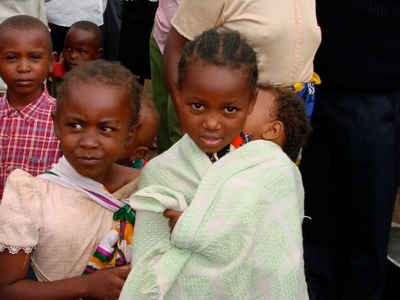
In the WNBA, I have the task of competing against some of the best athletes in the world, but in my trip to South Africa a few weeks ago I was faced with the challenge of combating one of the greatest killers in our world: AIDS. I am going to spend the next few blogs talking about what I experienced, the people I met, and what I learned. HIV/AIDS is a disease that entraps its victims because of certain cyclic economical, cultural, and political factors.
Lets take South Africa for example, where (depending on the region) you will find the prevalence rate for AIDS at an astonishing 30%. At first glance that number is quite daunting, and makes you really contemplate what angle is most affective to take action. I will start by illustrating what I believe are some of the main contributing factors, and then I will tell you what myself and other members representing the NGO Triadtrust (www.triadtrust.org) did to initiate change.
Like some of its Africa counterparts, South Africa is a politically divided and unstable country. One thing I have learned through the Nothingbutnets campaign, is that when it comes to distributing health care measures, there must be a strong, organized, and committed national government to make it work. If the voice of the nation is more concerned about staying in power than the welfare of its people, it becomes very difficult intrinsically or externally to establish an infrastructure that will educate, identify, and treat those with HIV/AIDS (or any other health issue). During his rape trial, Jacob Zuma (newly elected African National Congress leader) was quoted in the media saying that a person can simply take a shower after intercourse to eliminate the transmission of HIV. It is misinformation like this, coming from prominent national figures, that has enabled and augmented the course of this pandemic.
Poverty is another major component that must be considered. It not only leads to the obvious lack of resources, but also a lack of education (high illiteracy rate), a heighten rate of dependency on others (especially women who are forced to trade sex for food or money) and a disconnected conviction of how individual actions affect themselves and others. When life expectancy is low and mortality rates are high, the mindset tends to be: why worry about a disease that will kill me in the future or kill the person I am sleeping with when I am trying to get through today—live for today, and worry about tomorrow if and when I get there.
The remaining piece is intricately woven in the culture itself. The role of women in society diminishes their right to demand a partner to wear protection. Even more tragic, South Africa is the rape capital of the world, where on average there is one rape every 49 seconds. Young adults will often be engaging in sex before it is culturally suitable for them to talk about it, therefore eliminating the role of sex-education (if by chance there was education to be had). Finally, the ever-present stigma that accompanies anyone with HIV/AIDS, discourages most people from even getting tested.
Based on this information, I asked myself what I could possibly to do help. I can’t change the government, I don’t have the economic background to create financial solutions, but what I do possess is a platform given to me by the status of the sport I play and the knowledge of what it takes to build character and self-esteem. Triadtrust is an NGO that combines sports clinics with leadership training and HIV/AIDS education/prevention. Our objective is to first and foremost educate the coaches and the players on how the disease is transmitted, how it can be prevented, and the methods of treatment. Secondly, we spend time doing team-building exercises, role-playing, and round-table discussions about how these coaches and players can be better leaders and role-models in their communities. Lastly, we go out to either the basketball court or the soccer fields and teach them technical skills in their respective sports.
Yes, I realize this is a very grassroots approach to a disease of pandemic proportions. You must go into battle with a clear understanding of what your strengths are and where you can contribute. My small contribution is developing the skills and qualities that will enable the young men and women I work with to question what they have always known to be a reality and dare to dream of something better—this country is in desperate need of quality leadership, so I will try teach them what that looks like. Maybe it is my inherent optimism, but I believe in the small steps.




